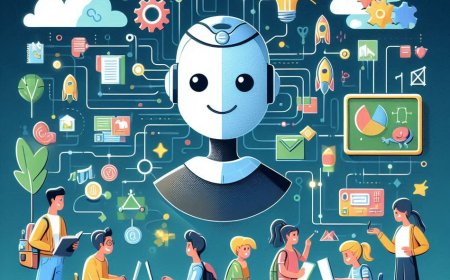Artificial Intelligence
The Technological Revolution Reshaping the World

In an era of rapid technological advancements, artificial intelligence (AI) has emerged as one of the most transformative tools reshaping industries. What was once a theoretical concept is now a critical driver of productivity, efficiency, and enhanced customer experiences globally.
This article explores AI's role in our daily lives, the significance of this technology, its broad applications across various sectors, and how it can be effectively leveraged to sell AI-based services.
The Importance of AI in the Modern Era
At its core, AI’s importance lies in its ability to enable systems to simulate human thinking and make highly accurate decisions based on vast amounts of data. In today’s digitally interconnected world, AI-powered technologies can quickly analyze complex patterns and deliver insights far beyond human capabilities.
1. Enhancing Efficiency and Decision-Making
With applications like machine learning (ML) and data analytics, AI allows businesses to automate routine tasks, enabling teams to focus on higher-value activities. For instance, financial institutions rely on AI models to predict market fluctuations and manage risks effectively.
2. Reducing Costs and Increasing Productivity
AI provides innovative ways to reduce operational expenses. In manufacturing, AI-powered smart robots streamline production processes and minimize human errors, saving both time and money.
AI Applications: Innovations Across Industries
AI has revolutionized various fields, bringing transformative changes. Below are some key sectors where AI has made a significant impact:
1. Healthcare
AI applications in healthcare exemplify how technology enhances human well-being.
- Medical Diagnosis: AI algorithms enable doctors to detect chronic diseases like cancer or heart conditions with greater accuracy and speed.
- Patient Record Management: AI systems streamline the management of medical records, ensuring greater organization and efficiency.
2. E-Commerce
AI has become integral to the e-commerce sector.
- Personalized Recommendations: Major online retailers utilize AI to analyze customer behavior and provide tailored product suggestions.
- Inventory Management: Smart algorithms optimize inventory based on forecasted demand, ensuring better stock control.
3. Education
AI is transforming education by personalizing learning experiences.
- Personalized Learning Systems: AI-powered platforms offer customized educational programs to meet individual student needs.
- Automated Grading: AI tools enable faster and more accurate evaluation of exams and assignments.
4. Digital Marketing
Digital marketing has been one of the biggest beneficiaries of AI.
- Marketing Data Analysis: AI tools analyze market trends and consumer behavior to provide valuable insights.
- Targeted Advertising: Machine learning models help create personalized ad campaigns based on customer data.
How to Sell AI Services Effectively
As the demand for AI solutions grows, companies offering AI-driven services can achieve remarkable success with the right sales and marketing approach.
1. Understand Market Needs
Before offering AI services, it’s essential to study the market and identify the challenges potential clients face. Are they looking to enhance customer experiences or automate operations? Market surveys and research provide valuable insights.
2. Develop Customized Solutions
AI services must be flexible to cater to clients’ specific needs. For example:
- Small businesses may require cost-effective data analysis tools.
- Large enterprises might need advanced systems to handle massive data sets.
3. Promote Services Effectively
Selling AI services demands a robust marketing strategy:
- Educational Content: Publish articles and case studies demonstrating how AI can improve business outcomes.
- Search Engine Optimization (SEO): Optimize content to ensure AI services rank higher in online searches.
4. Build Client Trust
Trust is crucial for selling AI-based services:
- Showcase success stories and case studies.
- Offer free trials or demonstrations to highlight the value of your solutions.
5. Provide Continuous Support
Businesses should offer technical support and training to help clients utilize AI solutions effectively, enhancing customer satisfaction and fostering long-term partnerships.
Challenges in Selling AI Services
Despite its advantages, selling AI-based solutions comes with challenges:
- High Initial Costs: Some solutions may seem expensive for small and medium enterprises (SMEs).
- Limited Awareness: Potential clients might hesitate due to a lack of understanding of AI’s benefits.
Conclusion
AI is not just a fleeting trend; it is the future that will redefine every aspect of life. By investing in AI-driven solutions, businesses can achieve significant productivity gains and boost profitability.
Whether you work in technology, healthcare, education, or e-commerce, adopting AI opens a world of opportunities. Start innovating today, develop solutions that meet market demands, and leverage AI to thrive in this competitive landscape.
What's Your Reaction?








































